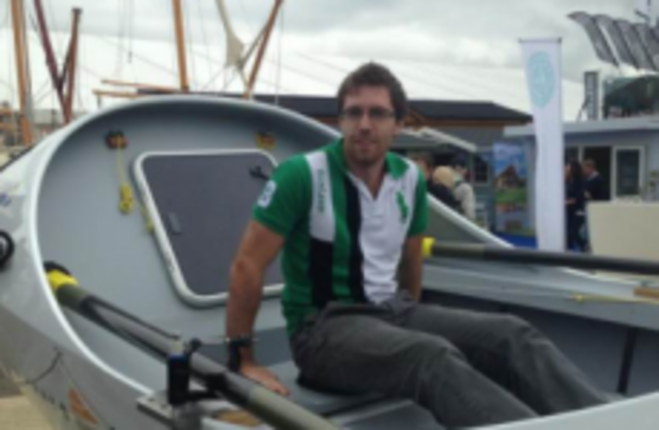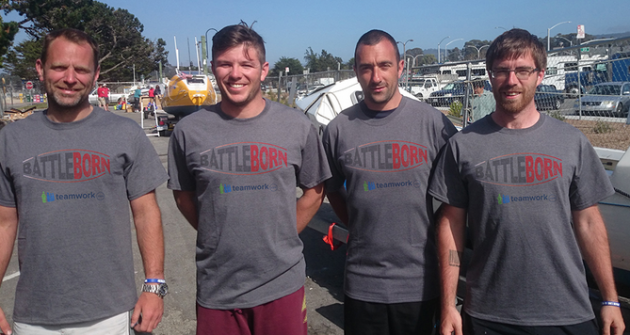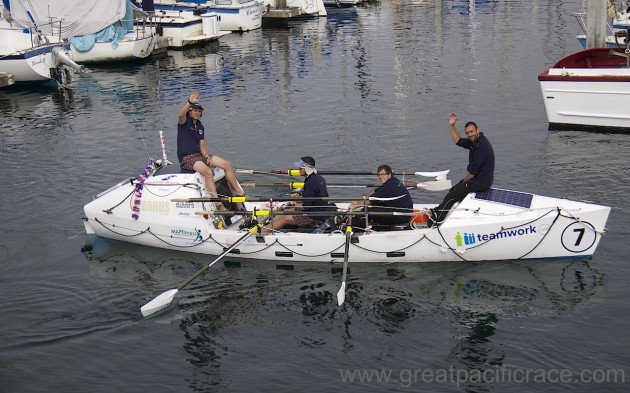PHILIP CAVANAGH SPENT 18 months preparing to row across the Pacific Ocean, yet it was only on the day he was due to set off that the magnitude of the task at hand fully hit home.
The start of the race had been postponed for a few days owing to adverse weather conditions, but when they finally did depart Monterey Bay along the central coast of California to begin their journey, the 27-year-old Bord Gáis worker from Palmerstown Dublin began feeling quite emotional.
Speaking to TheScore.ie over the phone while simultaneously rowing the Pacific, Cavanagh recalls the day where it all began.
“We got together in Monterey, having only met two of the lads out here. We’d been on our boat once before the race started. I wouldn’t say we were underprepared — we did have time. But I think we found that the determination to get out here takes you a long way.
“We were so busy, buying things and doing a lot of work that it didn’t really hit me until the morning of the race. It was pretty emotional then even leaving Monterey Bay. I got a bit choked up. It’s quite a big commitment to do it and to actually be realising you won’t be setting foot on the earth for at least six weeks…
“We didn’t have anybody at the start line, which was a shame, bar the host family that we were living with, so from that side it was quite emotional, and then saying goodbyes over the phone, it’s a lot more difficult [than you’d think].”
When I contacted Cavanagh on Friday evening, he confirmed that Team Battleborn were almost 18 days into their journey — one that they estimate will cost them in the region of £90,000 (€112,000) in total. Moreover, when we previously spoke last November about the 2,100-mile trip for which he was in training, he estimated that it would take roughly 40 days to complete the challenge (he now reckons it will be closer to 42).
However, Cavanagh admits he is currently not entirely sure how long a journey himself and his three teammates have left — factors such as weather conditions will be crucial in determining exactly how long their arduous adventure will last.
Each team is required to bring 70 days worth of food, so Cavanagh’s crew remain well stocked in that regard. Furthermore, the current world record is 64 days, set by a solo participant back in 1997, and they are all hopeful of at least breaking that landmark.
And speaking of groundbreaking achievements, Cavanagh will become the first Irishman ever to undertake the full journey should he prevail — he is part of a crew that also includes an Australian and two British men. They can also each make history in becoming the first group of four to complete the trip.
And incredibly, at the time of writing, they are second out of 30 teams from around the world (though it’s largely people born in Australia, New Zealand and Britain competing) in the race.
(The crew, from left to right: Darren Taylor, Dan Kierath, Barry Hayes and Philip Cavanagh, credit: www.pacificrow2014.com)
“We’re coming into the trade winds in the next week or so, and it just depends how strong the winds are and how quickly they push us towards Hawaii [the finishing point]. So it’s a bit of a conundrum not really knowing how long we’re going to be out here for, trying to ration everything.
“It’s a strange one, because when I started this whole campaign, it was win at all costs, trim down, [make the boat] as light as possible. But I kind of changed my mindset over the course of a year. It was the realisation that winning in this sort of environment isn’t everything. Just completing the challenge is enough.
“But then once we got out here and we got the first 10 days under our belt, it felt pretty good, so we’ve been hammering the oars and doing what we can to try to pick up the pace.”
And while they are currently performing extremely well, their trip hasn’t always been entirely seamless.
“We have some issues with our runner, so we’ve had to manually steer, which is slowing us down. Our ladder broke, we’ve had broken oars, that sort of thing, so that’s all slowed us down. But we’ve been keeping a close eye on the leaderboard and we’d love to be in contention coming into the last week. So we’re pushing our bodies as hard as we physically can at the moment to try to keep within touch distance of the first-place team.”
And while the aforementioned inconveniences can ultimately be rectified without great difficulty, one issue at the start of their trip threatened to derail the journey entirely. Dan Kierath, the Australian member of the team, fell badly ill for a considerable period not long after they had set off from Monterey.
“He came down with severe sea sickness,” Cavanagh explains. “He was basically bed ridden for the first week of the trip. The first two or three days he was getting out of bed, rowing, getting sick, and then rowing again. So we pulled him off the oars, we were in touch with the medical team on land and they told us if he didn’t improve ‘within the next 12 hours,’ then he’d have to go off the boat.”
A member of the crew leaving the boat would have resulted in disqualification for the entire team, so it was fortunate that Kierath’s condition promptly improved thereafter.
“We were kind of force feeding him and making him drink water… So that was probably the closest call we had, but none of the lads have done anything quite spectacular like this before. We’ve a lot to prove, but I knew from meeting them that we’d have the grit and determination to make it to the finishing line. And I still think we’d be doing quite well [to finish], whether we win the race or not.”
And while Cavanagh has luckily avoided such intensive illness himself, his current surroundings are far from comfortable. Is there anything in particular he misses from home?
“Apart from pints?” he laughs. “It’s disgusting! We’ve gone 17 days without a shower. We just hose ourselves down with a 500ml bottle of Gatorade with water in it and that’s our shower. We’ve no space to ourselves. My pillow consists of a tool kit and a load of chocolate bars that we haven’t yet eaten. And then I’m sleeping beside Darren, who likes to sleep fully naked, which is an experience to say the least. So personal space is probably the main thing.”
Similarly, during our previous conversation last November, Cavanagh also mentioned a number of potential problems, which included shark attacks and stormy weather. Has he encountered any of these hazards?
“The closest we’ve seen to a shark has been one turtle. Myself and Darren were on the oars and I thought I saw a Mexican hat, a sombrero, and I didn’t say anything, because I thought I was hallucinating again, but then Darren was looking at me and said: ‘Did you see the turtle?’ So we had an argument over whether it was a turtle or a sombrero. So no, we’ve haven’t seen much wildlife.
“In terms of the weather, the first week was an eye opener, as none of us had been in these conditions — I don’t think anyone in the race had. We knew it’d be tough to get away from Monterey. It was quite difficult for us to get out of the Bay. We had 25 to 30 foot waves for three or four days into the night. It’s pretty scary when you can’t see them coming and you’re just sitting there. But that’s the sort of thing you can’t train for — you have to deal with it when you’re out there.”
He continues, outlining how each team member sleeps six times a day in two-hour intervals: “In one way, it only feels like we’re just getting out here, in another, it feels like an eternity [since we started the race]. We’ve been essentially always rowing two hours on, two hours off. The first thing to hit us was sleep deprivation. We were expecting that to be pretty tough and it has been.
“We’re kind of getting into a rhythm, which is fairly good, with our two-hour rows. The night shifts are still the hardest part of it. Trying to stay awake at the oars is really difficult at four o’clock in the morning, when you want to be having a cup of tea in your bed.
“But I think we’ve adapted fairly well. We nearly capsized one of the days and one of the lads was on deck, and his main priority was to make sure the shoes didn’t go overboard. So that’s the sort of thing we’ve [had to worry about].
“We’re relatively calm. Everything that’s happened to us we’ve taken one step at a time. We had the 25 and 30-foot waves, but if we have them again, they wouldn’t seem as big. It’s just the first time [it happens], everything seems worse.”
(Team Battleborn pose for a pic — credit: ©Ellen-Hoke-Photography/www.greatpacificrace.com)
One further challenge is rationing food. All the team are under strict instructions in this regard, as a failure to “get the balance right” could seriously jeopardise their prospects.
And despite trying to eat as much as he can, Cavanagh estimates that he has lost a stone and a half in weight so far.
“We [ideally want] 4,500 calories per person per day, but it’s just impossible to get that many into you,” he says. “And then just protein shakes and things like that. But there’s been no massively scary moments, just a slow realisation that we’re in this for the long haul.”
He adds: “A lot of teams will want to trim their provisions down to get rid of some extra supplies that they have. So it’s trying to balance speed with common sense and making sure you do have enough to get you to the other side.”
Despite having limited minutes to make calls, Cavanagh has been in touch with friends and family from home via phone, as well as through emails and texts. He is also regularly in touch with one of their sponsors, Teamwork.com, providing updates of their progress in the process.
Moreover, having only come into contact with his teammates for the first time when they started preparing for this trip, Cavanagh says the crew have gotten on relatively well so far, despite constantly being within such close proximity of one another.
Speaking to TheScore.ie on this very issue last November, Cavanagh explained:
“I’ve said to the other lads, we’ve only really three rules on board — with the tight space that we have, there’s no negativity on the boat because you can’t go anywhere if you have a fight with somebody. The second rule is don’t be late for your shift. It’s important that you’re not two or three minutes late where those 60 seconds on the boat are golden — that’s all you have. Then the third rule is do not miss your shift. You find you get to the point where you’re bartering — you get to the point where you say: ‘I’ll give you this if you do five minutes.’”
The team are generally all complying with these rules, and have consequently maintained a good relationship.
“There have been no arguments onboard and we’re working closely with Teamwork to make sure we’re functioning as a team. From that aspect, it’s useful, because this is really a psychological challenge as opposed to a physical one. There isn’t that much of a physical challenge to just getting up and rowing again.
“I’ve done a lot of sports psychology. That sort of stuff prepares you for these situations, and you know you’re going to miss the treats at home and things like that. But that’ll make it a lot sweeter when we do get to Hawaii. I think we’ll appreciate the smaller things in life more.”
As part of their trip, Philip Cavanagh and his teammates are taking part in a fundraising initiative for a number of charities, including Aware and Irish Guide Dogs for the Blind. For more details on how to donate, please visit their website at www.pacificrow2014.com.



